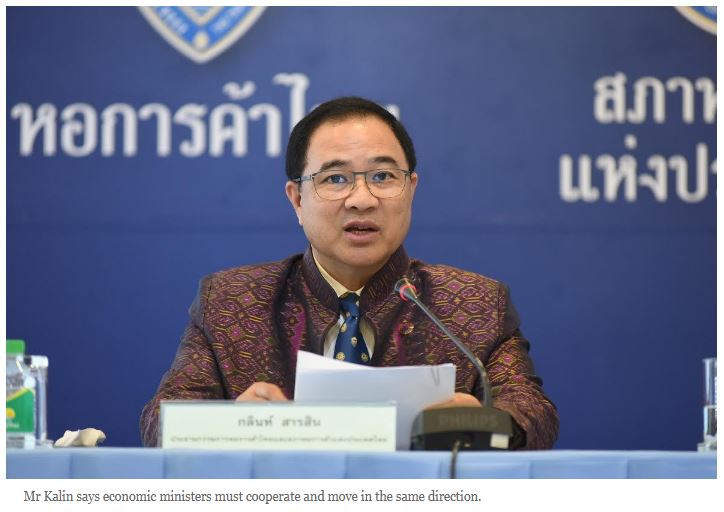Thailand: Private sector cautious of transparent policy roll-out
Business operators have hailed the new government’s policy manifesto, but added they are curious to see if it can be implemented quickly.
The private sector is calling for transparency in policy implementation and economic stimulus measures such as improving crop prices and solving bearish exports.
Kalin Sarasin, chairman of the Thai Chamber of Commerce, said as economic ministers come from different parties, cooperation is needed to ensure the economic measures move in the same direction.
“It is widely understood the global economy is faltering, with several countries being hard hit by lower shipments,” he said.
“Frequent talks and close cooperation are key for the government to come up with effective measures to spur exports.”
Mr Kalin said the top issues for the new government should be living costs and accelerating state spending on delayed projects and megaprojects such as roads or double-track rail networks nationwide.
Border trade stimulus is also a must to offset the country’s overall lower exports.
“The private sector proposes the government accelerate transport infrastructure to facilitate border trade, especially at the Mae Sot checkpoint in Tak province, which produces the hefty border trade value each year,” he said.
The government is being urged to manage the baht’s strength, promote the use of the baht as a key currency in trading with neighbouring countries and lure international tourists to boost tourism income.
Mr Kalin said the chamber’s priority is opposition to a daily minimum wage hike to 400 baht nationwide because they believe small and medium-sized enterprises will be hurt severely and possibly pushed into liquidation.
“The private sector urges the government to focus instead on upgrading workers’ skills so they can adjust to changing technology,” he said.
Supant Mongkolsuthree, chairman of the Federation of Thai Industries, said the industrial sector also supports with the new government’s policies, assuming that each ministry can implement the policies successfully and transparently.
“Our concern is whether the government will form policies and measures transparently, without raising public distrust,” said Mr Supant.
The people cannot inspect every public project, but the government has to be sincere about administering projects and benefiting the people, he said.
The downturn in crop prices requires urgent action from the government, said Mr Supant, because farmers are suffering vastly from declining income and an output surplus.
“The industrial sector is concerned about this matter, as droughts are expected to impact the agriculture sector this year,” he said.
Mr Supant said the private sector supports the government’s plan to set up an economic cabinet to bolster management and efficiency because the economic ministers are from various political parties.
The economic cabinet will include the finance, industry, transport, energy and commerce ministers, among others.
He asked the government to revive the joint public-private consultative committee as a mechanism to promote cooperation between the public and private sectors.
Morikazu Chokki, president and chief executive of Mitsubishi Motors Thailand, said that as Mitsubishi is a car exporter, stabilising the baht is its first priority for the government.
“As the country has already seen, overall exports in the first half declined, while global economy and trade have suffered much from the ongoing US-China trade war,” said Mr Chokki.
“For Mitsubishi, 80% of our car output is exported, so we have to manage the baht’s strength and volatility, which has become a significant risk for us.”
He said the car maker is concerned about minimum wage hikes, as many political parties campaigned on sharp increases.
“The government should gauge the wage rate against overall incomes and economic sentiment. Each hike should have an eye on sustainability for all stakeholders,” said Mr Chokki.
He said wages in the automotive sector increase by 6% per year and this level is acceptable for all manufacturers.
Mr Chokki said because GDP growth has been downgraded to 3.3% in 2019, the government should accelerate policy to mobilise the economy.
“Even 3.3% growth could help local sales reach 1-1.05 million cars, as Mitsubishi expects,” he said.
Source: https://www.bangkokpost.com/business/1718979/private-sector-cautious-of-transparent-policy-roll-out


 English
English






